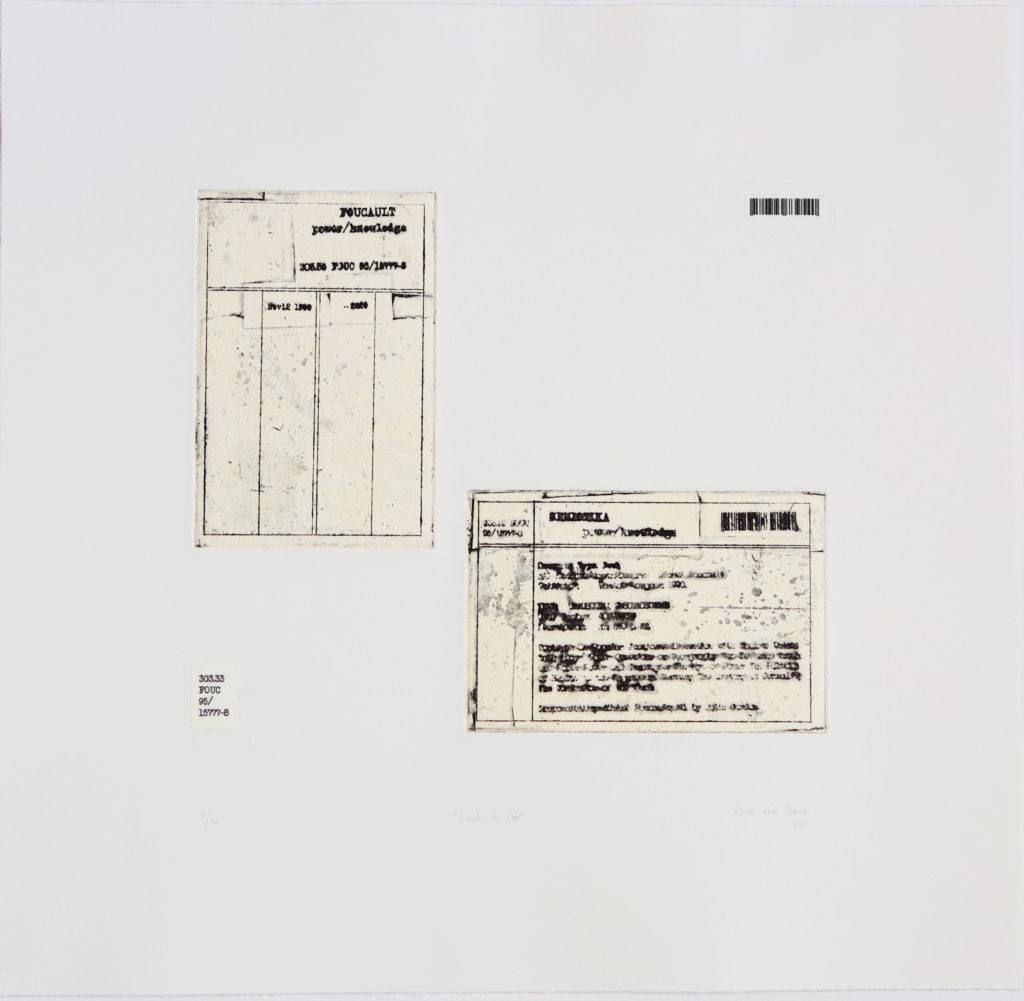
2020.
Drypoint Aquatint, 100%
Kozo Chine Colle, Digital Print
and Book Repair Tape .
Edition of 10.
2 41 x 42cm
De Beer’s work has been strongly focused on words as abstract imagery rather than carriers of semiotic meaning and the access to knowledge through the vehicle of books and the written word. These concepts are rooted within her personal experience of Dyslexia. “Look It Up” is a work that focuses on one’s ability to access knowledge and what we can gain from that knowledge. The print is made up of old library cards and library catalogue cards, which have become outdated forms of technology. They do still exist within some institutions, but due to their outdated nature, they are more of than not, discard.
To represent their discarded and also relic like nature, de Beer has made them look damaged and scuffed by types of mishandling and water damage through the use of aquatints. Through this process the cards looked mistreated and where water damaged and caused the words to bleed and become eligible. Through this process of abstracting the words, a visual tool that De Beer often uses within her works, the words now because abstract imagery represents written language rather than actual carriers of meaning. There is however one word within the print that is less distorted and that is the name of the author, Foucault. The information depicted on the cards is from Michel Foucault’s 1980 book, Power/Knowledge: Selected Interviews and Other Writings 1972-1977. In this particular book and in many of these writings Foucault’s investigates the history and the western ideas behind prisons, schools, barracks, hospitals, factories, cities, lodgings, families, sexuality and other organized forms of social life and their implications for understanding the social control of our bodies and our minds. This book and its essays are not without its flues and criticisms but there are valuable lessons that we as a society can learn and gain valuable insight from such a book in 2020. Within our society, we have access to information like never before and because of this, we think that we hold control in our lives. Yet we live in a global society that is trying to control our bodies and minds more than ever before. Where is feels like we are moving backwards in our society? As much as we need to look forward is also important to look back at our histories and to look at writers from our past so that we don’t fall within the same traps and repeat history. This print acts as a reminder of that past, a reminder of old forms of technology that can bring back a sense of nostalgia and of writings that we can look back to for knowledge.
Since we live in a society that seeks access and knowledge instantly, these cards aren’t going to bring this knowledge into people lives the way its needs to. We live in a digital age and often seek digital solutions. In light of this, within the print, the
viewer is offered two avenues to find this book and its information. Through the use of digital printing and acid-free book repair tape, there are two stickers on the print. One representing the doi-decimal code of Foucault’s book, which is one of the leading library coding systems to catalogue and locate books within libraries. The second is a barcode, representing the book’s ISBN number. This barcode can bring the books information immediacy to the viewer. All the viewer needs to do is have a QR and Barcode scanner application on their smartphones, and by scanning the barcode the viewer can search the result of the barcode and instantly find all the digital information on the book. Not only does this artwork bring written language and these cards into a visual art realm, but the print allowing the viewer to interact and activate the artwork. Through going out to look for the book in the library or in front of the artwork on their phones.
The artwork is about seeking out knowledge and how it is accessed. The more knowledge we have about the world and our histories the better we can make an informed decision as individuals to navigate through a sociality that is often trying to control how we access knowledge and how we move through the world in general. There is power in art and in the written word, a power that is often underestimated and it’s a power that should be celebrated.
